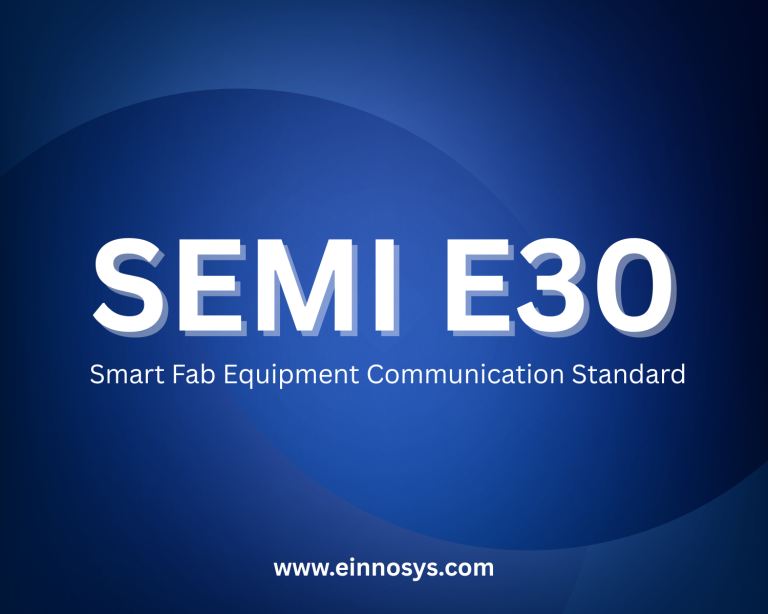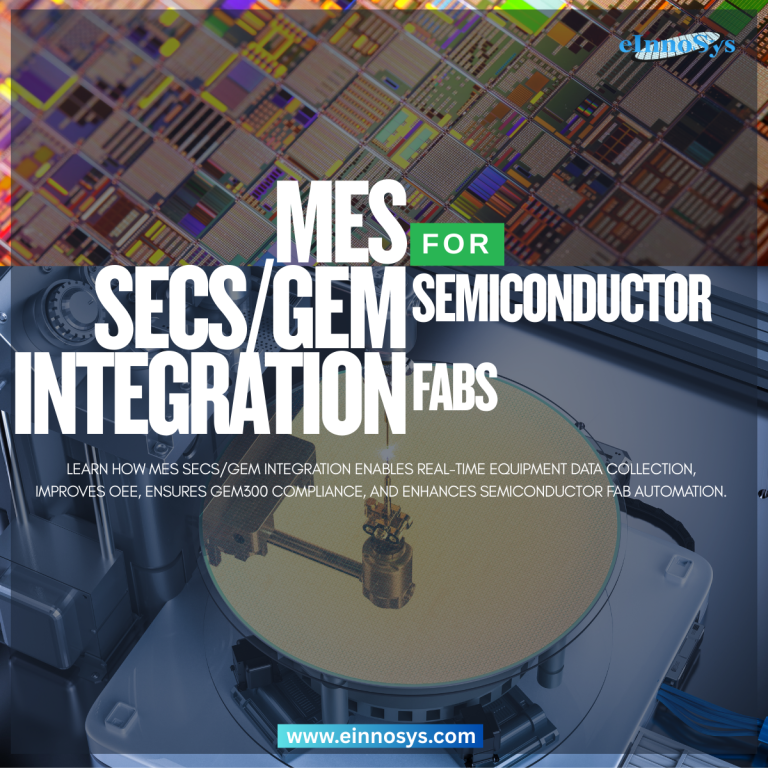SEMI E30 (GEM): The Generic Equipment Model powering Smart Fabs
Introducing SEMI E30
SEMI E30, commonly known as GEM (Generic Equipment Model), defines how manufacturing tools behave and exchange data with host systems. It enables consistent control, full traceability, and faster integration across semiconductor fabs.

Why GEM Matters
SECS/GEM simplifies equipment communication by eliminating custom integrations, standardizing alarms, events, and data collection. It speeds up new tool deployment and builds a strong foundation for advanced automation and analytics.
About Us
Einnosys: Global IT Outsourcing Leader in Factory Automation & Smart Technologies Einnosys specializes in Factory Automation, AI/ML, IoT, Industry 4.0, Smart Factory solutions, and predictive maintenance. We deliver tailored solutions for semiconductor fabs and equipment manufacturers, including: Factory Automation: Streamline and optimize manufacturing processes. Equipment Software Solutions: Enhance performance and connectivity. Industry 4.0 Solutions: Leverage AI, IoT, and machine learning for smart, data-driven factories. SECS/GEM Solutions: Ensure seamless communication and control. Transform your operations with Einnosys innovative technology solutions.
Core Capabilities (At a Glance)
Comprehensive tools and solutions to accelerate your semiconductor equipment automation
The Equipment State Model
The Equipment State Model defines clear states and safe transitions (Online/Offline, Local/Remote, Processing).
Alarms & Events
Alarms & Events standardized reporting for faster troubleshooting.
Remote Commands & Safeguards
Remote Commands & Safeguards controlled start/stop/pause operations with proper validation.
Recipe Management
Recipe Management remote upload, selection, and execution with complete auditability.
Data Collection & Traces
Data Collection & Traces real-time subscription or streaming of process and status data.
Benefits for Fabs & OEMs
For Fabs:
SECS/GEM enables faster tool onboarding, real-time analytics, and lower integration risk for smoother, more reliable automation.
For OEMs:
SECS/GEM provides a unified interface for all customers, reducing customization efforts while enhancing tool value and ensuring compliance with industry standards.
SECS/GEM Integration Products
Fabs & Assembly/Test/Packaging Products
- SECS/GEM addition & enhancement on legacy equipment – EIGEMBox & EIGEM-HMI
- E84 & E87 addition on legacy equipment – EIGEMBox
- AI/ML-based health monitoring & predictive maintenance – XPump
- Factory host – EIStationController
- Recipe Management System – EIRMS
- AI/ML based Smart FDC with Predictive Analytics – SeerSight
- Analog Gauge Monitoring – EIGaugeMonitor
- Equipment Simulator – EIGEMSim
- Factory host SDK – EIGEMHost & EIGEM300Host
- Chemical Management – EIBarcodeGuardian
- Spare Parts & Vendor Management – EICMMS
OEMs (Original Equipment Manufacturer) Products
How EinnoSys Can Help
At EinnoSys, we transform SEMI E30 requirements into fully functional, supportable interfaces that speed up integration and reduce production risk. Whether you’re an OEM adding GEM to a new tool or a fab automating legacy equipment, we make communication between systems seamless, reliable, and future-ready.
GEM Gap Analysis & Roadmap:
Quick evaluation of your current setup with a prioritized action plan.
Interface Design & Specification
Detailed state machines, variable/event dictionaries, and message maps aligned with your host system.
Implementation & SDK Integration
End-to-end GEM service development (on-tool, gateway, or middleware) with clean APIs and simulators.
Emulation & Conformance Testing
Host-grade emulators and test logs to validate behavior, performance, and compliance.
Migration & Legacy Enablement
Retrofit solutions that enable GEM on older tools without hardware disruption.
Training & Handover
Comprehensive documentation, operator training, and post-deployment support.
Why Customers Choose EinnoSys
- A production-first approach prioritizes reliability, traceability, and safe remote control.
- Accelerated integrations of our emulators and templates shorten host integration cycles.
- Vendor-neutral expertise, seamless work across diverse hosts, tools, and middleware.
- Built-for-support deliverables documentation and test artifacts that simplify handover.
- Security-aware design built in best practices for secure network integration.

FAQs About SECS/GEM SDK & Integration in Taiwan
What is SEMI E30 (GEM) and why is it important in semiconductor manufacturing?
SEMI E30, known as GEM (Generic Equipment Model), defines how manufacturing equipment communicates with host systems using standardized SECS-II messages. It enables consistent control, monitoring, and data exchange across different tools and vendors. GEM is essential for achieving interoperability, traceability, and automation efficiency within semiconductor fabs.
How does GEM help fabs reduce integration time and cost?
GEM eliminates the need for complex, custom point-to-point connections by standardizing data collection, event handling, and remote commands. This reduces engineering effort, simplifies onboarding of new tools, and accelerates time-to-production—significantly lowering integration cost.
What are the main capabilities of the GEM Standard?
GEM defines core functionalities including:
- Equipment State Models (Online/Offline, Local/Remote, Processing)
- Alarms and Events for real-time notifications
- Data Collection and Trace reporting
- Recipe Management for process control and auditability
- Remote Commands with safety and validation mechanisms
Together, these features provide full equipment visibility, better control, and reliable automation.
How does GEM benefit equipment OEMs?
For OEMs, implementing GEM means a single, unified interface that works across multiple fabs and customers. It minimizes customization, increases tool marketability, improves compliance with fab automation requirements, and reduces long-term support efforts.
Can GEM be added to older or legacy tools?
Yes. Legacy equipment can be upgraded using gateway software or middleware that translates proprietary equipment protocols into SECS-II messages. Einnosys specializes in retrofitting older tools with GEM interfaces—without major hardware changes—making them compatible with modern factory automation systems.
What is the difference between GEM and SECS-II?
SECS-II (SEMI E5) defines the message structure used for communication, while GEM (SEMI E30) defines how equipment should behave, report data, and respond to commands. In simple terms, SECS-II is the language, and GEM is the behavioral model that uses that language for standard equipment control.
Contact US
Contact us
einnosys
5899 Remer Terrace, Fremont,
CA 94555, USA
Tel: +1.805.334.0710
Email: sales@einnosys.com



